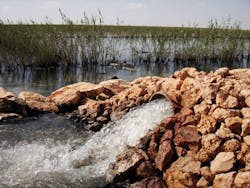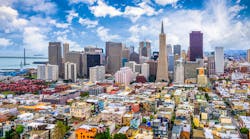By Pamela K. Racey
In the early 2000s, the City of Philadelphia was facing mounting regulatory and public pressure to improve its biosolids management program. At that time, approximately 30 percent of the city's biosolids were processed into Class A compost the highest quality recognized by the U.S. Environmental Protection Agency through a composting facility at the Philadelphia Water Department's (PWD) Biosolids Recycling Center (BRC). The remaining 70 percent of the biosolids were transported to landfill, land applied in three states for agricultural uses, or direct mine reclamation.
During the mid-2000s the PWD was experiencing increased tip fees associated with the landfill options, as well as increased fuel costs with transportation of biosolids made up of 70 percent water. Additionally and most importantly, the BRC aerated static pile compost was out of compliance with the Clean Air Act and Philadelphia Air Management Services regulation. In 2004, the PWD issued a request for proposals from qualified firms who would design, build, operate and finance new facilities to accomplish several objectives:
- Upgrade the BRC dewatering facilities.
- Improve odor management and site aesthetics of the BRC dewatering facilities.
- Develop the capacity to process 100 percent of the biosolids from the BRC dewatering facilities into Class A "exceptional quality" biosolids as defined by the US EPA.
- Manage the beneficial reuse of the product produced within the composting operation.
The winning bid was submitted by a Synagro lead team called Philadelphia Biosolids Services (PBS), which included additional services of companies such as Andritz Separation, a provider of heat/drying technology; design firm King Engineering Associates; and TN Ward Co. serving as the General Contractor.
The project consisted of an interim operations phase, followed by the design, build and operate (DBO) of the new facilities. The interim operations phase required Synagro to assume the operation of the existing BRC dewatering facility and provide management of all biosolids generated – approximately 220,000 tons per year from the PWD's three water pollution control plants. The DBO phase required the demolition of the moth-balled composting equipment, design and construction of the new $57 million Philadelphia Renewable Bio-Fuels (PRBF or pelletizer), thermal drying facilities, and operations of the PRBF to provide long-term, cost effective and environmentally sound management of PWD's biosolids.
During the last three years Synagro has operated the BRC centrifuge dewatering facility and provided complete management of the end-use of Philadelphia's biosolids. The new biosolids recycling center, made up of the upgraded dewatering facilities and the new PRBF, will process up to 65,000 dry tons per year of biosolids so that the material is stabilized and meets all requirements for Class A as outlined in 40 CFR Part 503.
The new facility includes a thermal drying building housing two Andritz DDS 110 drying trains, state-of-the-art odor and emission control, a pipeline to allow digester gas from the Southwest Water Pollution Control Plant facility to supplement up to 50 percent of required energy needs, new electrical substation, and three pelletizer product silos. Additionally, the incorporation of a green building rainwater collection system will reduce both the volume of stormwater routed to the wastewater treatment plant and the potable water used by the thermal drying facility.
The new recycling center was on track to be fully operational by February 2012. Next steps in the project is the development of a long-term management plan for the movement and sale of up to 60,000 dry tons of pellets, which will be produced annually by the BRC.
Some of the many benefits that the City of Philadelphia will realize from this project include:
- More than $200 million in savings over the 20-year contract.
- The creation of 75 construction jobs and 30 long-term jobs.
- One hundred percent of the city's biosolids will be transformed into a Class A product.
- The development of sustainable, renewable energy and organic fertilizer markets for the city's transformed biosolids.
- Minimized off-site odor, noise and traffic impacts.
- A reduction of annual truck deliveries by 70 percent.
- A decrease in current operations from 59 to 19 acres, allowing the city to recapture property for other uses.
- The reduction of greenhouse gas emissions, while bringing the facility into compliance with air emission regulations.
"The Philadelphia Biosolids Services team has run a clean and efficient operation throughout this entire project," said Howard Neukrug, Philadelphia Water Department Commissioner. "We are excited about our new direction for biosolids management as it is both cost effective and good for the well-being of our residents and our natural environment."
About the Author: Pamela K. Racey is Vice President of Business Development for Synagro, where she leads the company's efforts in developing facility-based, public-private infrastructure partnerships. Racey has more than 23 years of experience working with municipalities to improve their impact on the environment by lowering emissions, reducing their carbon footprint, and preserving natural resources by producing organic products than can be safely recycled.
More WaterWorld Current Issue Articles
More WaterWorld Archives Issue Articles





